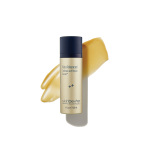Vitamin C is a powerhouse ingredient in skincare, widely used for its brightening, anti-aging, and skin-protecting properties. Here’s a detailed look at how vitamin C works in skincare and why it’s a popular choice in many beauty routines:
1. Benefits of Vitamin C in Skincare
- Brightens the Skin: One of the most well-known benefits of vitamin C is its ability to brighten the skin and even out skin tone. It helps reduce the appearance of dark spots, hyperpigmentation, and skin dullness by inhibiting melanin production. Regular use can give your complexion a more radiant and glowing appearance.
- Anti-Aging Effects: Vitamin C stimulates the production of collagen, a key protein that keeps the skin firm and plump. As we age, collagen production slows down, leading to fine lines and wrinkles. Vitamin C helps counteract this process, promoting smoother, more youthful-looking skin.
- Reduces Hyperpigmentation: It helps lighten dark spots, acne scars, and sun spots by inhibiting the enzyme tyrosinase, which is responsible for melanin production. This can result in a more even skin tone and brighter complexion over time.
- Antioxidant Protection: As a powerful antioxidant, vitamin C protects the skin from damage caused by free radicals (unstable molecules generated by environmental stressors like pollution and UV rays). It neutralizes these free radicals, preventing premature aging and skin damage.
- Boosts Skin Healing: Vitamin C promotes skin regeneration and repair. It can speed up the healing process after breakouts, wounds, or other skin damage, making it an essential ingredient for improving skin texture and resilience.
- Sun Protection (but not a substitute for sunscreen): While vitamin C doesn’t replace sunscreen, it can enhance the protective effects of sunscreen. It helps shield the skin from some of the harmful effects of UV radiation, such as redness and inflammation, although it doesn’t block UV rays like sunscreen does.
2. How Vitamin C Works in the Skin
- Collagen Synthesis: Vitamin C plays a crucial role in collagen synthesis. Collagen is a structural protein in the skin that provides firmness and elasticity. By stimulating collagen production, vitamin C helps keep the skin looking youthful and firm.
- Melanin Inhibition: Vitamin C inhibits the activity of tyrosinase, an enzyme involved in melanin production. This results in fewer dark spots and a brighter, more even skin tone.
- Neutralizing Free Radicals: Free radicals, which are generated by environmental stressors like UV rays, pollution, and smoking, cause skin damage and premature aging. Vitamin C neutralizes these free radicals, reducing oxidative stress and preventing cellular damage.
- Skin Barrier Protection: Vitamin C also helps support the skin’s natural barrier function. This can help the skin retain moisture, reducing the appearance of dryness and fine lines.
3. Forms of Vitamin C in Skincare Products
Vitamin C comes in various forms and derivatives in skincare products, each with slightly different properties and effectiveness. The most common forms include:
- Ascorbic Acid (L-Ascorbic Acid): This is the purest and most potent form of vitamin C, but it is also the most unstable and prone to oxidation. It’s highly effective but can be irritating to sensitive skin, especially at higher concentrations.
- Sodium Ascorbate: A more stable and gentle derivative of ascorbic acid. It is often used in formulas for sensitive skin.
- Ascorbyl Palmitate: A fat-soluble form of vitamin C that is more stable in formulations and less irritating. It’s often used in oil-based products.
- Magnesium Ascorbyl Phosphate: A stable, water-soluble derivative of vitamin C that is less irritating and suitable for sensitive skin types.
- Tetrahexyldecyl Ascorbate: A stable, oil-soluble form of vitamin C that penetrates the skin deeply and is gentle on the skin. This form is less likely to cause irritation.
- Ethyl Ascorbic Acid: Another stable, water-soluble form of vitamin C that’s often used for brightening and pigmentation treatments.
4. How to Incorporate Vitamin C into Your Skincare Routine
- Serums: Vitamin C serums are one of the most common and effective ways to apply the ingredient. These serums often contain higher concentrations of vitamin C (10%-20%) and are applied directly to the skin after cleansing and toning.
- Moisturizers: Some moisturizers contain vitamin C, providing hydration and antioxidant protection in one step. These may have lower concentrations of vitamin C compared to serums.
- Cleansers: Vitamin C cleansers are less common, but some formulas incorporate vitamin C for gentle brightening during the cleansing step.
- Face Masks: Vitamin C-infused masks can provide an extra boost of radiance and skin rejuvenation.
- Eye Creams: Some eye creams are formulated with vitamin C to target dark circles, puffiness, and fine lines around the delicate eye area.
5. How to Use Vitamin C in Skincare
- Morning Application: Vitamin C is often used in the morning because of its antioxidant properties, which help protect the skin from free radical damage caused by sun exposure and pollution.
- Layering: Vitamin C serums should be applied to clean, dry skin before moisturizing. If you’re using other active ingredients (like retinol or AHAs), it’s best to use them in separate steps or alternate them with vitamin C to avoid irritation.
- Sunscreen: Always follow up with sunscreen when using vitamin C in the morning. While vitamin C provides some UV protection, it’s not a substitute for sunscreen.
6. Best Concentration of Vitamin C
- Low Concentration (5%-10%): These are ideal for beginners or those with sensitive skin, as they are gentler and less likely to cause irritation.
- Medium Concentration (10%-15%): Suitable for most skin types and effective for brightening and collagen stimulation.
- High Concentration (15%-20% and above): Best for those with more resilient skin and those targeting deeper signs of aging and hyperpigmentation. However, higher concentrations may cause irritation for sensitive skin.
7. Side Effects and Considerations
While vitamin C is generally safe for most people, it can cause irritation, redness, or stinging, especially with higher concentrations or in individuals with sensitive skin. To minimize irritation:
- Start with a lower concentration.
- Patch test before using a new product.
- Use vitamin C products only once a day, especially in the beginning, to gauge how your skin reacts.
Oxidation: Vitamin C is sensitive to air, light, and heat, which can cause it to oxidize and lose effectiveness. Look for products in opaque, air-tight packaging to ensure stability. If a vitamin C product turns brown or smells off, it may have oxidized and is no longer effective.
8. Conclusion
Vitamin C is a powerful and versatile ingredient in skincare, offering a wide range of benefits like brightening, anti-aging, and antioxidant protection. Whether you’re looking to reduce dark spots, improve skin texture, or protect your skin from environmental stressors, vitamin C is an excellent addition to your skincare routine. Just be sure to choose the right form, concentration, and application method for your skin type and needs.

